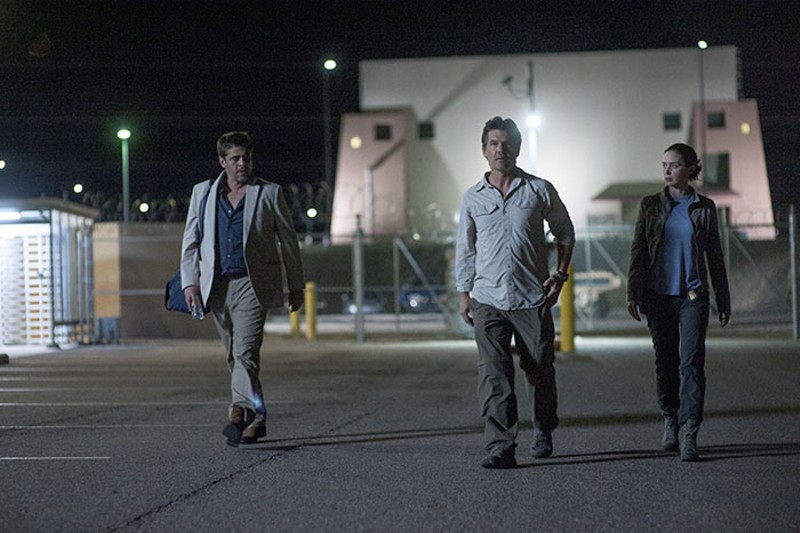The "war on drugs" may be a bullshit term invented by our overlords to justify both overly aggressive policing on local and national levels, and indiscriminate and excessive imprisonment for minor infractions. It may be a self-perpetuating excuse for a never-ending rain of cash for institutions and individuals. But the war on drugs has never felt more like an actual war than in Sicario. Yet this is no bit of propaganda designed to sell us that war; it is a scathing condemnation of the lawlessness that the war on drugs has fostered in those fighting it, even — especially — the supposed good guys.
Director Denis Villeneuve raises the bar he himself set after his intense and harrowing Prisoners with a movie that might best be described as "on a warpath"; though not willingly on the part of the protagonist, FBI agent Kate Macer (Emily Blunt). She serves as the lead on a drug squad's hostage-finding and -rescuing team — and as the film begins, we see just how brutal this work can be. Sicario's opening sequence, a joint FBI and Arizona SWAT raid on one of the properties owned by a known drug lord, is nail-biting and bone-chilling: When one seasoned FBI agent has to step outside to vomit, you almost want to join him. What the cops find inside the house isn't visually very graphic, but that almost makes it worse, because your imagination fills in the gruesome details. The scene sets the tone for the rest of the film.
And yet, Kate's experience here is nothing compared to what she will encounter when she joins an inter-agency task force with a much larger purview than her current mission. She's not sure why the task force needs her, and she's not even sure she's gotten a clear answer as to who these guys are: Is flip-flop- and Hawaiian-shirt-wearing badass Matt (Josh Brolin) DEA? CIA? Who does the civilian-appearing Alejandro (Benicio Del Toro) represent? It's someone or somewhere south of the border, obviously, because he calmly, pityingly informs the new girl that "nothing" she witnesses in their work together "will make sense to [her] American ears."
Kate is no innocent, no shrinking violet: she was not the one who had to step outside to throw up. But now she is through a looking glass and down a rabbit hole, and getting deeper at every turn into a world in which the rules she knows don't apply — and this infuriates her. Her idealism comes smack up against the "realities" of the war on drugs; not that the horrifically messy situations the players find themselves in aren't real, but that they are artificially manufactured by everyone on both sides. Matt, at one point, justifies the supremely awful things they're doing by saying that as long as people are willing to shove white powder up their noses, this won't end. Unspoken — yet hovering over the entirety of Sicario in a silent criticism — is this: A legal and regulated drug trade would also bring the war we witness here to an end.
Sicario is one of the best movies of the year, for numerous reasons.
For the incredible performances; Villeneuve had to battle for Blunt to take on a part that the Hollywood powers-that-be wanted rewritten for a man, but she is a huge part of what makes the movie work. Blunt makes Kate tough and smart and capable, but as a woman in what has traditionally been a man's role — law enforcement, that is, not starring in action dramas. Her Kate also brings the subtle criticism that new perspectives in law enforcement are needed, though not always welcome. (Del Toro is also amazing here.)
For the savage atmosphere, which at times feels more like dystopian science fiction than ripped-from-the-headlines actuality.
For the pulse-pounding score, by Jóhann Jóhannsson, which thrums like war drums, or a heartbeat.
And for how, like Kate, Sicario rages with frustration against the realpolitik — realpolicing? — that has colonized and taken over the ideals of fairness and justice that we pretend rule us.







